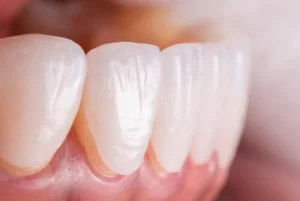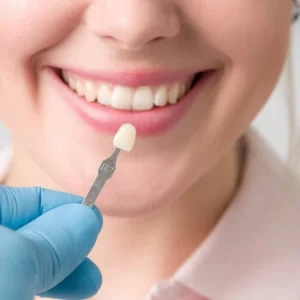Wondering, “Can you whiten porcelain veneers?” You’re not alone in asking that. When your veneers start to look less bright than before, it’s natural to question whether whitening could bring back their original glow. Maybe years of coffee, tea, or red wine have changed their tone just slightly. Porcelain veneers are designed to resist stains, yet everyday habits can still influence how they reflect light. Understanding how whitening works and what really helps lets you protect your investment and keep your smile looking naturally balanced for years to come.
Understanding Why Veneers Don’t Respond To Whitening
Maintaining the colour of your veneers starts with knowing how they interact with whitening treatments. Unlike natural teeth, veneers are crafted from non-porous materials that behave differently when exposed to whitening products. Recognising this difference helps you make smart decisions about treatment and care.
How Porcelain Veneers Differ From Natural Teeth

Why Veneers Cannot Be Whitened Like Natural Teeth
Traditional whitening treatments and at-home whitening treatment kits are designed to whiten your natural teeth by breaking down stains within the enamel. Since porcelain and composite material do not absorb stains the same way, these methods don’t change their shade. If you attempt to whiten porcelain, the results will affect only your natural tooth underneath, not the veneer’s outer layer. This mismatch can make veneers appear darker in contrast. Dental professionals recommend professional cleanings over whitening treatments for veneer maintenance because whitening treatments only work on the tooth structure itself.
Common Misconceptions About Whitening Veneers
Many people believe that whitening gels or strong toothpaste can whiten veneers, but veneers cannot be whitened using these methods. Abrasive products may instead dull their surface and shorten their lifespan. Others think brushing harder will remove surface stains, but this can scratch the glaze that protects your veneers. The safest approach is to brush your teeth with a soft-bristled toothbrush and use non-abrasive toothpaste. If you’re noticing discolouration, visit your dentist for advice on safe ways to remove surface stains and assess whether your veneers need attention.
How Food, Drinks, And Habits Affect Veneer Colour Over Time
Although veneers are stain-resistant, certain foods and drinks can still leave traces on the surface coating. Red wine, coffee, tea, and sauces can create superficial marks that dull their brightness. Smoking and poor dental hygiene can also lead to minor veneer staining around the edges.
Practical Ways To Keep Veneers Bright And Maintain Dental Health
Once you understand how whitening doesn’t apply to cosmetic veneers, the focus shifts to caring for them correctly. Proper care not only maintains their colour but also protects the underlying teeth and gums for long-term stability.
How Professional Cleanings Remove Surface Stains Safely
Professional cleanings performed during regular dental check-ups help remove surface stains from porcelain or composite veneers without damaging them. Dental professionals use special instruments and polishing pastes designed to protect the smooth veneer surface. These visits also allow early detection of gum disease or gum recession, which can expose the margin between your veneers and gums. Keeping this area healthy helps your veneers continue blending naturally with surrounding teeth.
Caring For Veneers At Home With Proper Dental Hygiene
Good oral hygiene plays a central role in maintaining the brightness and integrity of dental veneers. Regular brushing, flossing, and rinsing help prevent stains and plaque build-up. Use a soft-bristled toothbrush and non-abrasive toothpaste to avoid scratching the surface. Regular brushing also keeps your natural enamel and gums healthy beneath and around the veneers. When you practise good oral hygiene consistently, it helps prevent stains, maintain the balance between veneers and natural teeth, and support overall dental health.
When Veneers Need Replacement Or Adjustment

What To Discuss With Your Dentist Before Whitening Treatments
Before scheduling professional teeth whitening treatments, visit your dentist to discuss your options. Whitening gels and whitening treatment systems work effectively on natural teeth, but won’t whiten your veneers. If your veneers look dull compared with nearby teeth afterward, your dentist may suggest replacing veneers to match the lighter shade of your natural teeth. They can also recommend professional cleaning schedules, maintenance for composite veneers, and proper care instructions to keep your smile consistent after any whitening session.
A Confident Smile That Lasts
Veneers are crafted to complement your natural teeth and remain bright for years when cared for correctly. Although whitening cannot change their colour, maintaining good habits and brushing your teeth regularly helps them stay fresh and clean. Scheduling regular professional cleanings also keeps them looking healthy. Avoiding foods and drinks that stain veneers, such as red wine and coffee, helps preserve their surface. If your veneers have dulled with age, professional advice on replacing veneers or cleaning techniques can restore harmony to your smile. For expert guidance on veneer care or replacement, contact our clinic today at 07 4801 7035 to arrange an appointment.
References
https://www.colgate.com/en-in/oral-health/veneers/what-are-veneers-and-how-should-you-care-for-them
https://www.webmd.com/oral-health/veneers
